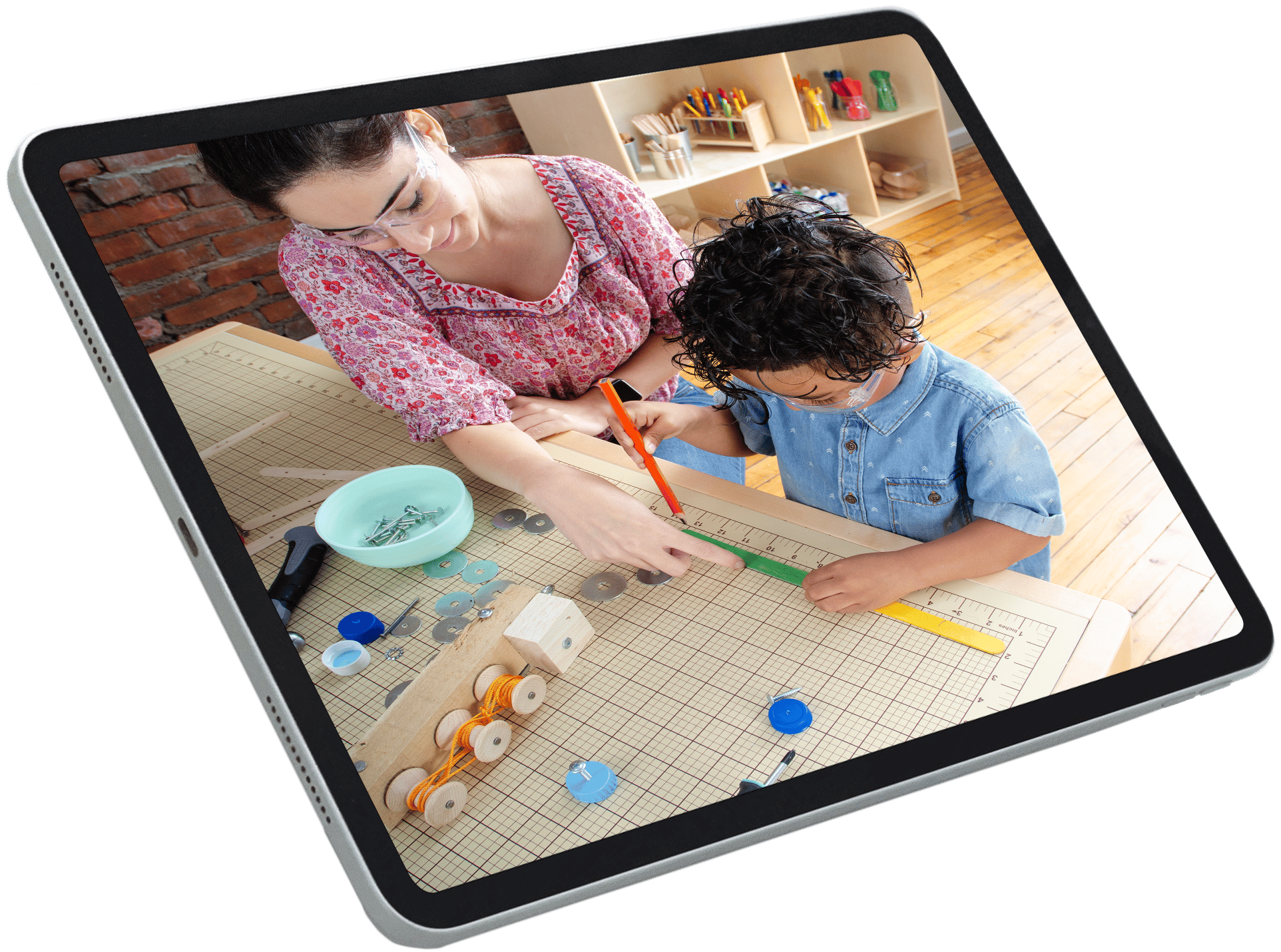
In this blog, Dr. Angela Eckhoff offers guidance on implementing practical strategies that support the needs of families and educators during the COVID-19 pandemic.
As the COVID-19 pandemic runs its course, we are seeing an ever-changing myriad of health and safety measures and recommendations that are locality specific. It is also clear that establishing one-size-fits-all recommendations for educators and families would not be effective as responses are best tailored to the needs of local communities. However, families and educators continue to rely on our collective support as they make the best possible decisions for children while navigating through this health and economic crisis.
What remains consistent during this uncertain time is that connectedness — the intentional linking of schools, homes, and communities — is vitally important for children. By valuing our connectedness, we can show support for each other and for our children so that, when we are eventually able to join together in person, we have positive mindsets and relationships in place.
To support connectedness, it is important that the adults in children's lives have support in managing stress. Experts at Johns Hopkins1 outlined valuable recommendations to manage stress during the COVID-19 crisis.
Families and early childhood educators caring for young children should be supported in:
- Taking care of their physical and emotional health. Taking time to plan for healthy eating, sleeping, and self-care routines is necessary for all of us. Encouraging families and educators to create daily, weekly, or long-term plans can help ease chaotic feelings but such plans should stress flexibility so adaptations can be made as needed. Sample schedules tailored by children's ages can be helpful for families seeking to establish healthy routines. Additionally, if families are participating in remote learning, recommending age/grade-based daily schedules that demonstrate a balance between on-line learning, gross/fine motor activities, unstructured play, and parent-child time can help families establish a routine that is mindful of the whole child.
- Paying careful, mindful attention to negative thoughts. It is important to stay informed during this time but monitoring our reactions to upsetting external information and internal negative thoughts is important so that we can intentionally move ourselves away from them. As adults in the lives of children we are charged with the challenging task of managing our own emotions but will also need to support children's responses as well. Taking time to acknowledge our own feelings is a necessary first step — as is the reminder on airplanes that we must put on our own mask before helping others. Creating achievable action items or daily activities can help us bring a sense of power and autonomy to our lives and move us past feelings of helplessness. As educators and parents, we can involve children in the creation and completion of daily tasks in order to build feelings of achievement and a sense of normalcy.
- Identifying the onset of a strong emotional response and anxiety. We can support ourselves and others by recognizing the signs of strong emotional responses and anxiety. It can be easy engage in the constant "what ifs" of child care or education decisions so it is very important to remind both families and educators that there is not one "right" response or decision during this time and that they are only responsible for making informed choices based upon what they believe to be best at the given time.
The Yale Center for Emotional Intelligence2 provides further guidance for managing healthy reactions to anxiety. It is important to understand that, as caretakers, both early childhood educators and parents/guardians need to take care of their own thoughts and feelings before they can effectively help children. Calming strategies — breathing exercises, self-care practices, reaching out for support or a friendly shoulder to lean on — are important daily practices.
Being mindful about developing a strong knowledge base about COVID-19 is also important for quelling anxiety and the fear of the unknown so it is important to consult reliable and up-to-date sources of information such as the Center for Disease Control and your local information sources for updates on current guidelines. Finally, open and clear communication practices are centrally important to build connectedness:
- Communication sometimes is the best way to calm emotions and fears. Talking with other educators, parents, and friends can help to bring new perspectives to our lives. We can also support children through age-appropriate communications which includes children's literature.
- A few suggestions include: The Way I Feel by Janan Cain, Color Monster: A Story About Emotions by Anna Llenas, and A Little SPOT of Anxiety: A Story About Calming Your Worries by Diane Alber.
- Ask others how they are feeling or why they're feeling that way. Don't just assume you know or understand.
- Take your cues from others, particularly children, on what to discuss in order to meet them where they are at. Suggestions for talking about challenging feelings or events with children include:
- Be honest and answer their questions. Responding to children's questions and concerns with an honest response that is at their level of understanding will help to ensure open communication.
- It is ok and welcome to share your feelings. Labeling your emotions will help to build their knowledge of emotions.
- Keep in mind your child and their level of understanding and development. A great resource for understanding children's developmental stages of social emotional development can be found on the Child Development Institute's website.
- Remember that what is best for you, your family, or your school may not work for others. Supporting the differences between us will build connections and understanding.
Working through the many uncertainties dealt to us during this time is difficult for everyone which makes it all the more important to be a source of support for each other. Our early childhood community has always excelled at the ideals of care, inclusion, equity, and knowledge because of our strong, interconnected networks of educators, families, and community. As we work to support each other through this crisis, we can be assured that we will continue to honor that legacy during this time.
About the Author
Dr. Angela Eckhoff is an associate professor of Teaching and Learning—Early Childhood Education and director of the Virginia Early Childhood Policy Center at Old Dominion University. She holds a dual PhD from the University of Colorado—Boulder in educational psychology and cognitive science. She is a coeditor of the Full STEAM Ahead column for Teaching Young Children from NAEYC. Dr. Eckhoff studies the role of creativity in child development and learning, arts-based research and pedagogical practices, and early STEAM learning in both classroom and museum settings. She is also the author of the Creative Investigations Series (Creative Investigations in Early Science, Creative Investigations in Early Engineering'Technology , Creative Investigations in Early Art , Creative Investigations in Early Math) and Provoking Curiosity: Student-Led STEAM Learning for Pre-K to Third Grade.
References1 Nguyen, Jaclyn, Kevin MacKrell, Neda Gould, and Karen Swartz. "Managing Stress and Coping with COVID-19: Johns Hopkins Psychiatry Guide." Johns Hopkins Psychiatry Guide, 2020. https://www.hopkinsguides.com/hopkins/view/Johns_Hopkins_Psychiatry_Guide/787387/all/Managing_Stress_and_Coping_with_COVID_19.
2 "Managing Anxiety Around COVID-19." RULER Approach, 2020. https://www.rulerapproach.org/managing-anxiety-around-covid-19/.
